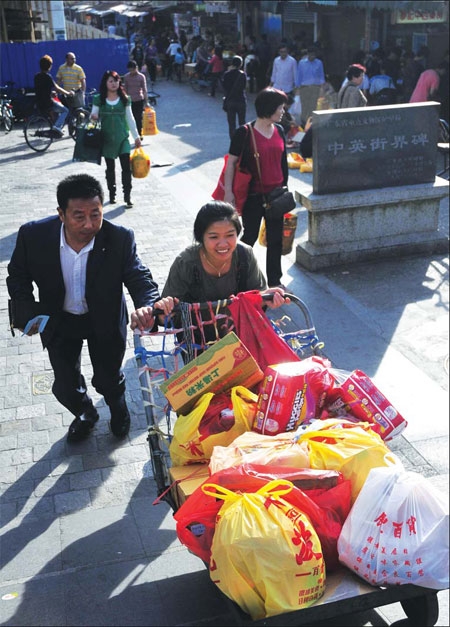Hong Kong draws mainland bargain hunters
Updated: 2010-12-24 13:02
By Bao Chang (China Daily European Weekly)
Consumers in Shenzhen GO for cheaper DAILY necessities amid rising prices on mainland
After finishing class on Friday afternoon, Huang Xiaoyu, a postgraduate student at the University of Hong Kong, headed straight for the Sha Tin shopping mall located 40 minutes from his home in Shenzhen.
"My mother asked me to buy some food and flavoring to help prepare for our family celebration during the New Year holiday," Huang said.
Huang is from Shenzhen and has been studying in Hong Kong for more than a year.
"I have begun to buy some daily necessities in Hong Kong and I take them to Shenzhen every weekend, because the price of the same products in Hong Kong has become much lower than that in my city this year," he said.
Hong Kong, a globally acknowledged shopping paradise which used to attract people because of the relatively low price of luxury goods, has become many Shenzhen residents' favorite venue for buying daily necessities, as consumer prices on the Chinese mainland continue to rise.
Huang said bottles of Hong Kong-produced flavoring made by Lee Kum Kee cost HK$6.96 (5.95 yuan or 0.68 euros), whereas the price in Shenzhen is 20 yuan (2.29 euros), nearly four times more. Housewives in Shenzhen can buy two apples for 10 yuan but HK$10 gets you four of the fruit in Hong Kong.
|
 |
"I have begun to learn Mandarin recently to provide better service for Shenzhen housewives," said Chen Shuhui, a 55-year-old sales clerk at the Sha Tin shopping mall. Sha Tin is a suburb in which most residents are native-born Hong Kong people.
"We could not speak Mandarin before, because there are not as many people here from the Chinese mainland as in Tsim Sha Tsui or Causeway Bay," Chen said.
Nowadays, Chen said she hears Mandarin being spoken on most days while Cantonese has become sidelined, with more people heading to the area to buy daily necessities.
The shopping mall has launched specific promotional activities to lure more mainland customers. Huang said if he buys goods worth more than 800 yuan, it covers the cost of a return ticket to Shenzhen.
"I will buy daily necessities as much as possible in Hong Kong if prices keep on rising in my city," Huang said.
Zhang Ying, a young mother in Shenzhen, bought six cans of powdered milk on the Sino-British Street on the Hong Kong side of the border.
"If I buy infant milk in Hong Kong for my baby, I can save more than 200 yuan each time because the exchange rate of Hong Kong dollars against the yuan is constantly declining," Zhang said.
The exchange rate is another reason behind Shenzhen housewives' enthusiasm for daily necessities in Hong Kong. According to the Shenzhen Administration for Industry and Commerce, the number of visitors to Sino-British Street rose from 1,500 to 3,000 people daily in November. During the weekends, the number of visitors often exceeds 10,000 people a day.
As the yuan gradually rises in value against the US dollar, the Hong Kong dollar, which is pegged to its American namesake, will inevitably decrease in value against the yuan, enabling Chinese mainland people to buy more goods in Hong Kong for the same amount of money.
"It's natural tendency for Shenzhen residents to buy daily necessities in Hong Kong when they feel the effect of rising consumer prices locally," said Song Ding, director at the tourism department of the Shenzhen-based China Development Institute.
Pei Liang, secretary-general at the China Chain Store and Franchise Association, said the loss of customers will put more pressure on retailers in Beijing, Shanghai and Shenzhen who have already suffered from increasing consumer prices and fierce market competition.
"To maintain normal operations, they should enhance their service and maintain high cost-effectiveness to balance the benefits of manufacturers, customers and themselves," Pei said.
Inflation has been a hot topic this year for the man in the street, analysts and policymakers. A senior member of an influential government think tank said earlier this month that China's inflation rate could rise to nearly 6 percent during the first quarter of next year.
E-paper

Ear We Go
China and the world set to embrace the merciful, peaceful year of rabbit
Preview of the coming issue
Carrefour finds the going tough in China
Maid to Order
Specials

Mysteries written in blood
Historical records and Caucasian features of locals suggest link with Roman Empire.

Winning Charm
Coastal Yantai banks on little things that matter to grow

New rules to hit property market
The State Council launched a new round of measures to rein in property prices.
